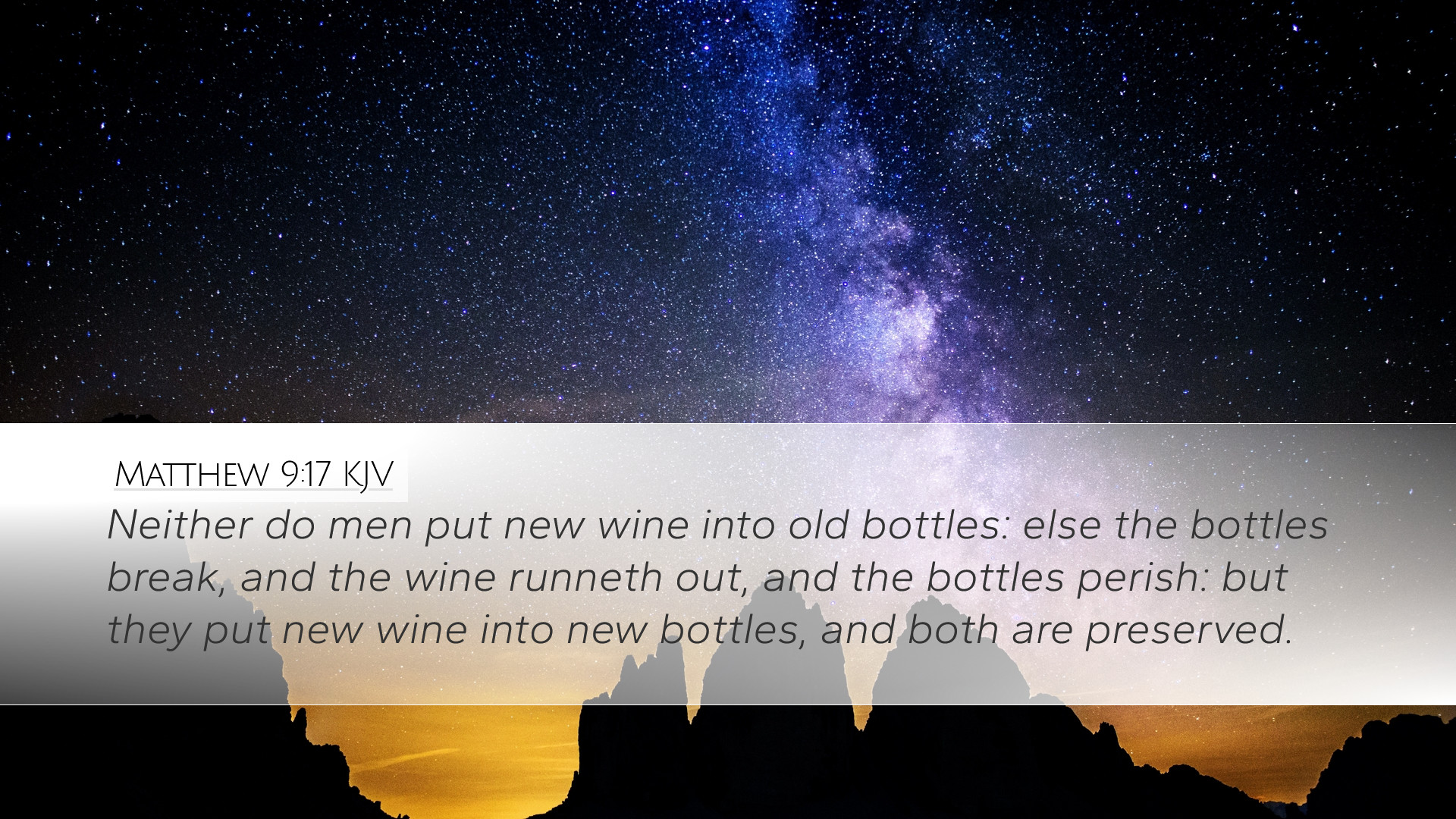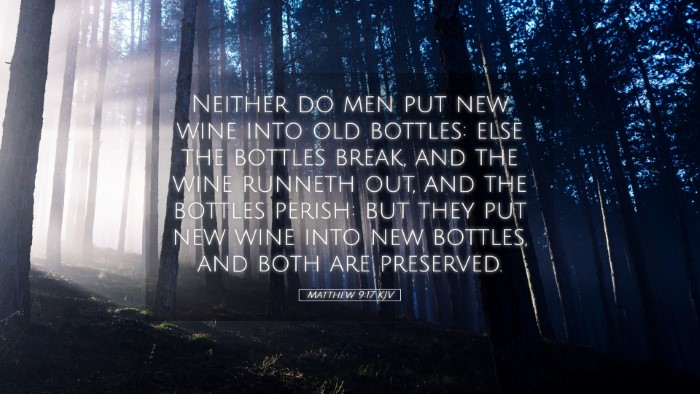Commentary on Matthew 9:17
Matthew 9:17 states: "Neither do men put new wine into old bottles: else the bottles break, and the wine runneth out, and the bottles perish: but they put new wine into new bottles, and both are preserved." This profound verse is part of Jesus’ discourse regarding the nature of His ministry and the radical change it brings to traditional Judaism.
Contextual Analysis
This statement arises in the context of Jesus’ teachings and interactions with the Pharisees. The disciples of John the Baptist question why Jesus' disciples do not fast. In this setting, Jesus employs the metaphor of wine and wineskins to illustrate the incompatibility of His message with the rigid traditions of the Pharisaic Judaism of the time.
Insights from Matthew Henry
Matthew Henry emphasizes that the new covenant in Christ's blood represents “new wine,” which cannot be confined within the old structures of the Law. He remarks on the necessity of understanding that the ministry of Christ introduces a transformative power that challenges established religious norms. The analogy of new wine requiring new bottles indicates that the gospel necessitates a fresh approach, one that is adaptable to the life-changing implications of the Kingdom of God.
Insights from Albert Barnes
Albert Barnes elaborates on the implications of “old bottles” being unable to hold “new wine.” He explains that old wineskins, once stretched and no longer elastic, cannot contain the fermenting process of new wine which expands and requires flexibility. Barnes interprets this as a warning against the rigid adherence to antiquated practices that cannot accommodate the grace and reality of the New Testament revelation. The New Covenant brings a renewal that requires a corresponding renewal in understanding and practice.
Insights from Adam Clarke
Adam Clarke provides a detailed exposition on the cultural background of wineskin usage in biblical times. He notes that wineskins were made from animal hides and would become rigid and fragile with age. Clarke argues that if one were to pour fresh, unfermented wine into old skins, the resultant pressure would cause the skins to burst. This imagery serves as a stark warning to the religious leaders and followers resistant to change. Clarke points out that Christ’s mission was to bring about a radical transformation that was in harmony with, yet distinct from, the Jewish traditions.
Theological Implications
The metaphor of new wine and new bottles conveys significant theological insights that resonate with Christian doctrine today:
- Transformation: The coming of Christ symbolizes a profound transformation in how God relates to humanity, moving from old covenant formulations to a new, intimate relationship through Christ.
- Flexibility: Spiritual growth demands flexibility; believers are challenged to adapt their understanding and practices to the dynamic nature of God’s revelation in Christ.
- Change Resistance: Resistance to change can lead to spiritual stagnation. Being set in one's ways can hinder the experience of the new life offered by Christ.
- Inclusiveness of the Gospel: The new wine represents the broad inclusiveness of the Gospel, extending beyond the boundaries established by traditional laws and customs.
Applications for Modern Readers
As pastors, students, and theologians engage with this scripture, they are invited to reflect on the following applications:
- Examine Traditions: It is essential to regularly assess how church traditions align with the teachings of Jesus and the nature of God’s Kingdom.
- Stay Open to New Insights: Embrace the new revelations of the Holy Spirit, which may challenge previous understandings of scripture and doctrine.
- Promote Vitality within the Church: Encourage a vibrant, living faith that adapts and grows rather than adhering to lifeless forms.
- Emphasize Relationship over Ritual: Focus on cultivating a genuine relationship with Christ that supersedes mere ritualistic observance.
Conclusion
Matthew 9:17 serves as a powerful reminder of the need for believers to embrace the newness that Christ offers. Through this commentary, we see the significance of Jesus’ words in a historical, cultural, and theological context, emphasizing that the gospel is intended to rejuvenate and transform. The call remains for Christians to be willing vessels, prepared to receive the rich and refreshing new wine of God’s Kingdom.


